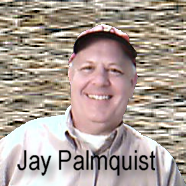 Yes, this couple is out front of their house letting everyone know they're making a killing in real estate. He's got a pitchfork in hand ready to poke any trespassers that try to send any postcards to his farm prospects.
Yes, this couple is out front of their house letting everyone know they're making a killing in real estate. He's got a pitchfork in hand ready to poke any trespassers that try to send any postcards to his farm prospects.She's ready to back him up with that "ol' school marm warning" expression, which barely hides her exuberance over the $40,000 they pocketed as a down payment yesterday from the house they just seller-financed.
Yup! This couple flips houses bought from desperate, anxious sellers, and then turns around and seller-finances new credit-challenged buyers. More specifically, they take over loans and resell those loan terms to those that couldn't borrow a rake (or a pitch fork) at this point.
Two years ago, this couple found out what kinds of houses were selling the fastest and in what area over the previous 90 days. They discovered that the three and four bedroom houses in the 37237 zip code were the most common, and fastest selling properties. So they staked a claim in that zip code and mailed postcards to all the three and four bedroom home owners letting them know they buy houses. This stake, or claim is referred to as a "farm". Not to be confused with raising crops of course, but cultivating a profit nonetheless.
Farms are important to investors for several reasons. First, they focus the investor on an area that he can become intimately familiar with. This is important, because familiarity with values/comps trumps about anything else, even cash, when it comes to finding, funding, and flipping houses.
Others may have cash, too, but the professional investor that is cultivating a well-defined geographical farm area (defined here as something one can drive to and back from in 45 minutes) can and will beat any potential competitor to the punch because he can first instantly recognize the deal for what it is --- and land the deal like a seasoned airline pilot, before anyone else knows there's a deal.
Meanwhile, the amateurs are still compiling comps, addresses, computer print-outs, and pouring over last-minute CMA's (comparative market analysis), biting their nails, second-guessing themselves, if not simply flying blind. That's no good.
The best way to start and maintain an investing career is to first choose, and cultivate a farm area. It doesn't really make difference where the farm is, as long as the investor has enough prospects to pick over in a given geographical area, and become more intimately familiar with it than practically anyone else is/can/will.
The fastest way to fail in real estate investing then is to fail to have a farm defined. "Southern California" is a "region", and for our purposes of discussion would be considered a lousy farm. Any one zip code in "Southern California" would be superior to the entire region.
I'll just say, nobody can be an expert in a region, but few can be more of an expert than the investor who cultivates a familiarity around a one mile square. Of course the uniqueness of a property may dictate the size of the farm. For instance, say we're looking to buy a slightly used nuclear power plant, we might have to resort to a farm the size of a "region" just to get enough prospects on our mailing list!
Short of this, however, we need to focus on a specific territory, or farm area, so that we can be the fastest, most reliable buyer around.
After all, there's no such thing as "stealing in slow motion".
///







